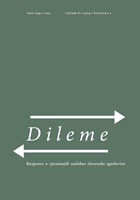
Aleš Maver, Ukrajina od Igre prijestolja do rata za neovisnost, Celjska Mohorjeva družba
Review of: Aleš Maver, Ukrajina od igre prestolov do vojne za samostojnost, Celjska Mohorjeva družba, Celje 2023, 280 strani.
More...We kindly inform you that, as long as the subject affiliation of our 300.000+ articles is in progress, you might get unsufficient or no results on your third level or second level search. In this case, please broaden your search criteria.

Review of: Aleš Maver, Ukrajina od igre prestolov do vojne za samostojnost, Celjska Mohorjeva družba, Celje 2023, 280 strani.
More...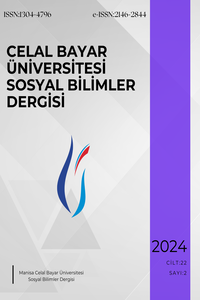
Russia's dominance in the Black Sea has diminished since the post-Soviet era. As a result, feeling threatened by the increasing influence of other countries in the region and NATO's advances toward the Black Sea, Russia has created specific problems and crises in the area. Russia annexed Crimea in 2014 to further enhance its dominance in the Black Sea and subsequently declared war on Ukraine in 2022. In response, Western states severed ties with Russia and imposed various sanctions. Türkiye adopted a neutral stance. Simultaneously, while supporting Ukraine, it maintained its relations with Russia and displayed a cooperative approach. The aim of this article is to elucidate the balancing role assumed by Türkiye in the Crimea annexation and the Ukraine war. The article analyzes whether Türkiye, according to Morton A. Kaplan's balance of power theory, acts as a balancing power in the Black Sea.
More...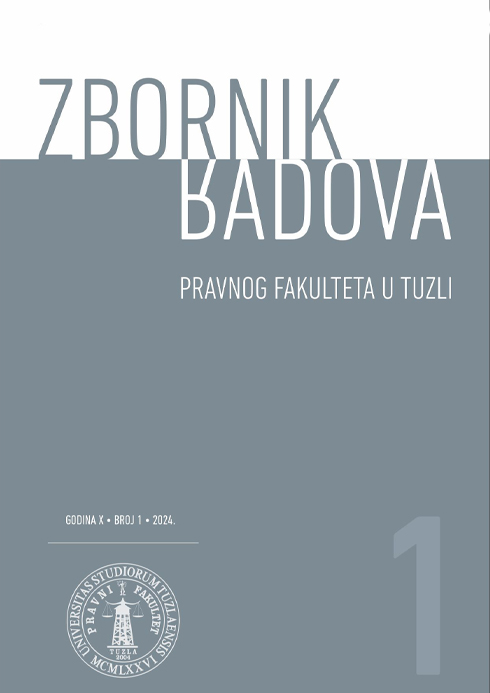
The CJEU has consistently developed his role of the protector of the rights of the persons against whom the restrictive measures were directed. This CJEU’s role implied evaluation of the legality of the restrictive measures in the light of the principle of proportionality. Starting as a part of the fight against terrorism the CJEU’s part as a guardian of legality of restrictive measures has continued until today in the context of the Russian invasion in Ukraine. The political environment created by that situation, as important as it is, cannot transformed CJEU in the plain political body. The CJEU has to insist even more on the rights of the objects of the restrictive measures while taking into account its main goal: protection of the Union’s values, fundamental interests, security, independence and integrity as well as preservation of peace, prevention of conflicts and strengthening of international security.
More...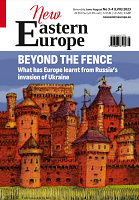
Russia’s full-scale invasion of Ukraine has become a defining moment in European security for this generation. For the second time in the post-Cold War period, Europe has witnessed a full-scale war on the continent, yet this time one of the belligerents (and the main aggressor) is a state possessing nuclear weapons. In February 2022, the Kremlin strategy was to quickly invade Ukraine and set up a proRussian government in Kyiv, which would not only end Ukrainian sovereignty but also further destabilise the security situation in the region and beyond. Russia’s actions, however, failed to achieve such a result. This was largely thanks to Ukrainian resistance but also the mass support, including weapons, money and humanitarian aid, provided to Ukraine by the West.On April 25th 2023, New Eastern Europe hosted an expert roundtable discussion on the current lessons learnt from Russia’s full-scale invasion of Ukraine, and to prepare recommendations for NATO and its member countries ahead of the July 2023 summit in Vilnius. The summary of this roundtable, with some important lessons and recommendations, is presented here.
More...
Despite various sanctions put in place against Russia for its invasion of Ukraine, the Russian economy is surprisingly doing much better than expected. It appears for now that at least in the short term, the Russian economy is able to bypass sanctions as long as other countries are willing to pursue business as usual with Russia. Whether or not the sanctions will have a longer-term effect and have any impact on Russian aggression remains to be seen.
More...
While Russia’s war in Ukraine has become a regular story in European and world media, its physical connections with the wider world have become severely restricted. Now reliant on railways and roads to transport both people and goods, the war-torn nation now dreams of a future in which airplanes will no longer bring destruction and death.
More...
Ukrainian refugees who arrive to France face the daunting task of not only coming to a new country where they do not speak the language but also of trying to understand the complicated bureaucracy. In many cases, additional help from volunteers and online community groups is the only way to fully navigate the process.
More...
The civic campaign “By_Help” started as an online initiative to help repressed Belarusians back in 2017. Little did the founder expect that both the success and need for the programme would only grow in the coming years. Despite all the challenges, By_Help is still working, providing the much needed aid that so many Belarusians require in the face of extreme repressions.
More...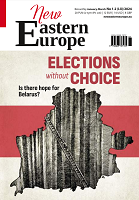
The onset of dialogue between the Ukrainian authorities and the Belarusian democratic forces began in autumn 2022. However, it did not continue so strongly in 2023. This can be partly explained by the difficult situation on the battlefield in the Russian war against Ukraine, which is naturally the priority for the authorities in Kyiv. At the same time, Ukraine has maintained its diplomatic relations with the authorities in Minsk.
More...
The people who head the central banks of Belarus, Ukraine and Russia are usually regarded both in the West and in the expert circles of their countries as the most liberal or technocratic in the economic governance structures. They are all well-read, experienced and have contacts abroad. However, the institutional reality of Belarus, Russia and even Ukraine is that all three central banks remain heavily dependent on the presidential centres.
More...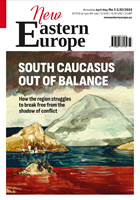
When Putin is finally gone, a majority of the elite and population will want Russia to return to Europe. Europe should facilitate that. There is a massive generational shift currently underway in Russia. These people are open to the outside world, western culture and are independent of the Russian state and Soviet ideology. That shift is closer than people think and the world needs to be ready. That is where the next battle will take place and it is one the West could lose.
More...
The Bulgarian far-right Revival presents themselves as “the only patriotic party” in Bulgaria. However, a review of their public discourse uncovers a rather disturbing fabric of their patriotism – a strange mix of anti-NATO rhetoric, unrefined populism, xenophobia, and profanity. Their sudden electoral success raises many suspicions.
More...
Democracy and imperialism are mutually exclusive. No empire was, is or can be democratic. The British Empire was not, the imperial People’s Republic of China is not, nor will imperial Russia become a democracy, even when a self-professed democrat is installed at its helm. The necessary precondition of democratization in an empire is decolonization.
More...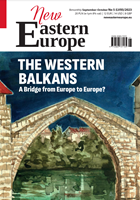
Russia’s full-scale invasion of Ukraine stressed the importance of engaging the Western Balkans more closely. The strategy behind the West’s renewed interest was twofold: bring Kosovo and Serbia closer to a deal to normalise relations and simultaneously move Serbia away from the Russian orbit. Despite initial enthusiasm in early 2023, relations quickly soured once again. What will it take to overcome this impasse?
More...
The ongoing crimes committed by Russian forces in Ukraine have shocked audiences across the world. However, there appears to be a certain banal nature to these seemingly extraordinary events. A reflection on the writing of Hannah Arendt may help us better understand how such unmitigated evil can occur on an everyday basis.
More...
Ukraine’s newly liberated territories still show the scars of war. Critical infrastructure often remains damaged and life remains anything but ordinary. This is particularly true in the case of schools, with the education system in the town of Izium simply unable to provide for the country’s youngest citizens.
More...
Vladimir Putin’s recent orders to return artefacts to “Golden Ring” cities around Moscow only further reveal the Kremlin’s attempts to tie present issues to the past. Possessing histories stretching back to the time of the Rus’, these cities are once again playing a highly important role in Russian identity.
More...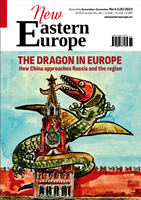
The window of opportunity that was once wide open for China to establish a robust presence in the Czech Republic has closed due to a multitude of unfulfilled pledges and growing tensions in bilateral relations. Furthermore, China’s pro-Russian leanings in the Ukraine war has sparked concerns about its appeal as a viable partner.
More...
Russia, both as a state and a collective of individuals, is guilty of the many war crimes committed in and against Ukraine under the banner of the Russian flag. However, leaving the argument at “Russia is guilty” is both reductionist and dangerous, as it can absolve individuals of their guilt whilst at the same time trivialising the pain and suffering caused at the hands of individuals and their actions.
More...
Despite its claims to be willing to implement all the necessary reforms for EU candidacy, the Georgian government’s measures have been slow. Substantial progress has been missing in the areas where strong political will is required. While Georgia received the European Commission’s recommendation on granting it EU candidate status, much work is yet to be done.
More...